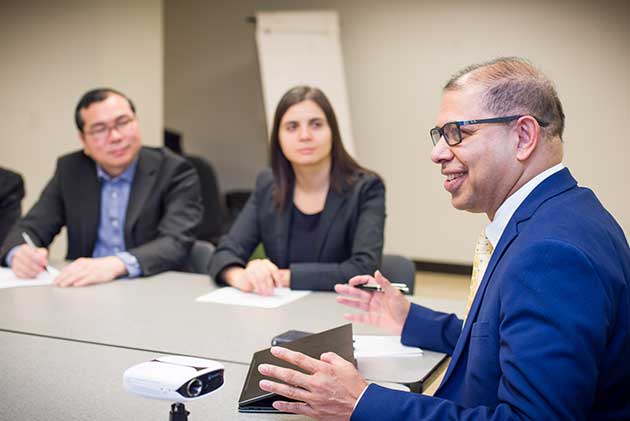Developing Country Health Professionals Sidelined in Canadian Healthcare

Shafi Bhuiyan. Credit : ITMDs file photo
TORONTO, Canada, Jun 15 2021 (IPS) - In Canada, we are fortunate to have many talented newcomers eager to contribute to the country, including thousands of doctors from Africa, Asia and the Middle East who meet Canadian standards but are blocked from becoming practicing physicians. These doctors are Canadian citizens and permanent residents with recognized training and experience.
Internationally Trained Medical Doctors (ITMDs), also known as International Medical Graduates (IMGs) are individuals who obtain their medical license outside of Canada. ITMDs face significant barriers to obtaining a medical license to practice in Canada (Wong & Lohfeld, 2008). Residencies must be completed to obtain a medical license in Canada, yet there are few residency positions available to ITMDs compared to those trained in Canada.
In 2011, over 1,800 International Medical Graduates competed for only 191 residency spots that were set aside for ITMD (Thomson & Cohl, 2011). After decades of employment experiences, still thousands of ITMDs must seek other employment opportunities. However, many are unable to find employment commensurate with their training, and some are unable to find employment at all (Environics Research Group, 2014).
If now isn’t the time for Ontario to make better use of the trained doctors who are already here, when will it ever be?
To practice medicine in Canada, ITMDs must have an approved medical degree and pass merit based qualifying exams, i.e. Medical Council of Canada Qualifying Exam 1 (MCCQE1), The National Assessment Collaboration Examination Objective Structured Clinical Examination (NAC OSCE), Medical Council of Canada Qualifying Exam 2 (MCCQE2). A large number of ITMDs have already met these requirements and are keen to serve Canadians who need access to healthcare.
During the pandemic, many of these doctors worked tirelessly to help Canadians stay healthy, even on a volunteer basis. Numerous graduates of Ryerson University’s unique ITMD Bridging Program, which helps internationally trained medical doctors transition into careers in the non-licensed health sector,have been hired to help with Ontario’s COVID-19 response.
A rapid survey of ITMD program alumni from recent cohorts (2019- 2021) was conducted by [Bhuiyan, Orin and Krivova, 2021] with the purpose of identifying their current status regarding licensure preparations to practice medicine in Canada. We targeted 100 alumni out of 277 through an online survey using SurveyMonkey, and we received 97 responses.
The rapid survey illustrated that 35% of these ITMDs have already completed the MCCQE1 and NAC OSCE. Despite being eligible to join residency programs, the wait time for residency opportunities is 4- 10 years. The remaining 65% of surveyed participants/ITMDs have not completed the medical licence qualifying exams; 44% of respondents are still considering this option, but are unsure.
Of those [35%] who have already passed the exams, many are still waiting on opportunities to complete residencies, while others are losing hope and interest in a future in clinical practice. Immigrant internationally trained doctors in Canada want and deserve equal opportunities to practise medicine.
There is an acute shortage of family doctors in Ontario’s rural and northern areas. Before the pandemic, Ontario needed thousands of new doctors within the next few years to keep up with those who are retiring and the increased needs of an aging population. The COVID-19 pandemic has exacerbated this issue and increased the need for doctors. Offering internationally trained immigrant professionals a clear path to use their medical experience and qualifications will positively impact the ITMDs as well as their surrounding communities.
ITMDs are skilled health professionals who immigrated with the potential of contributing to the Canadian healthcare system. Canadian demographic pattern is continually changing, which makes it vital to keep up with the diverse cultural needs andaddress inequity in Canadian healthcare system. Canadian long-term care facilities, ageing population, indigenous community, immigrants and migrant workers, and rural health care facilities, are now under pressure in these changing times.
Statistics show that Canada is at the lower end of OECD countries with average doctors per capita being 2.8/1,000 people where OECD countries have 3.5/1,000. It is imperative that we have more physicians in Canada.
To ensure a win-win situation in post-pandemic health care setting in Canada, let’s work together [academics, policy makers and civil society] to help support new immigrant health professionals and local community to ensure that no one will be left behind.
The author, Dr. Shafi Bhuiyan PhD is Asst. Professor, University of Toronto’s Institute for Pandemics and co-creator of the pilot MScCH Program at the DLSPH, University of Toronto; co-founder of ITMDs Post Graduate Bridge Training Program at the Chang School and Adjunct Professor at the Faculty of Community Services, Ryerson University; Board Chair, Canadian Coalition for Global Health Research
- ADVERTISEMENTADVERTISEMENT


IPS Daily Report







